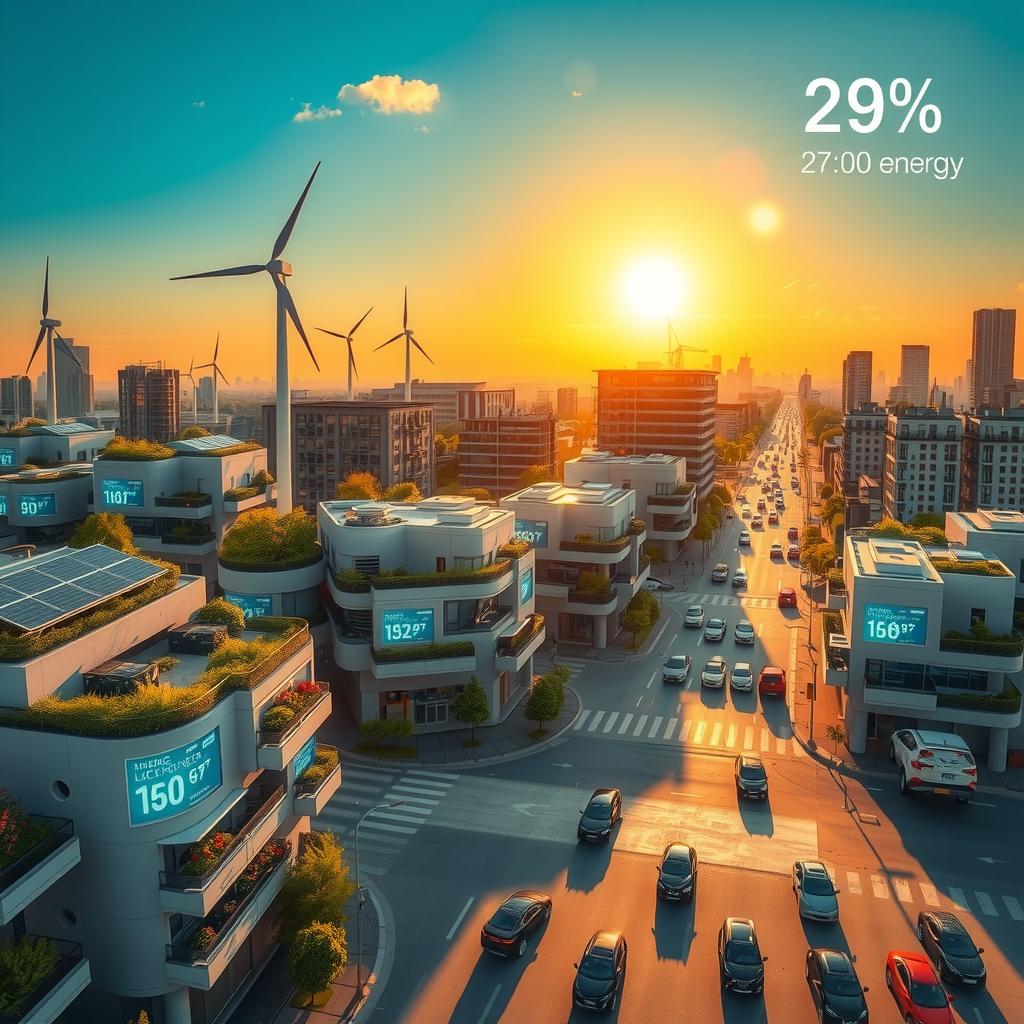In an age where energy resources are becoming increasingly scarce and environmental concerns loom larger than ever, the challenge of optimizing energy consumption has never been more critical. With rising utility costs and a growing awareness of sustainability issues, industries are searching for innovative solutions to enhance their efficiency. The question arises: how can organizations meaningfully reduce their energy usage without compromising productivity? This blog post delves into the transformative potential of machine learning algorithms in addressing this pressing issue.
As businesses strive to fine-tune their operations, the implementation of advanced resource management strategies becomes essential. Machine learning offers a powerful toolkit that enables companies to analyze vast amounts of data related to their energy consumption patterns. By harnessing these insights, organizations can identify inefficiencies and optimize processes in real-time, leading not only to significant cost savings but also contributing positively towards sustainability efforts.
The core value presented in this article lies in understanding how various algorithms within machine learning can be applied specifically for efficiency improvement across different sectors. Whether it’s smart grids adjusting power distribution based on demand or manufacturing plants refining production schedules, ML-driven solutions provide tailored approaches for minimizing wasteful practices while maximizing output. Readers will learn about practical applications that lead directly to measurable improvements in overall performance and resource utilization.
Furthermore, as we explore the intersection between technology and environmental stewardship through these optimization methods, it becomes evident that adopting intelligent systems is no longer just an option; it’s a necessity for forward-thinking enterprises committed to sustainable growth. From predictive analytics forecasting future consumption needs to automated controls regulating usage during peak hours—this discussion will illuminate pathways toward achieving superior operational effectiveness.
By guiding readers through compelling examples and case studies demonstrating successful implementations of machine learning techniques aimed at reducing energy footprints, this post aims not only to inform but also inspire action within organizations seeking robust frameworks for tackling today’s challenges head-on. Join us as we uncover the myriad ways energy consumption optimization using ML algorithms stands poised at the forefront of revolutionary change—an indispensable ally on our journey toward a greener future.

Key Points:
-
Harnessing Advanced Algorithms for Energy Optimization: Machine learning algorithms play a crucial role in optimizing energy consumption by analyzing large datasets to identify patterns and inefficiencies. Organizations can implement these advanced techniques to enhance their resource management, leading to significant efficiency improvements across various sectors. By utilizing data-driven insights, businesses can make informed decisions that directly impact their operational performance while simultaneously reducing their environmental footprint.
-
Real-World Applications in Diverse Industries: The application of machine learning in energy optimization is evident through numerous case studies showcasing its effectiveness. For instance, predictive maintenance systems in manufacturing plants leverage sophisticated algorithms to anticipate equipment failures before they occur, minimizing unnecessary downtime and conserving energy resources. Similarly, intelligent load forecasting utilized within smart grids allows for better demand management, ensuring that energy supply aligns with consumption needs efficiently. These examples underscore the transformative potential of machine learning technologies in achieving sustainability strategies.
-
Long-Term Benefits Through Proactive Strategies: Embracing machine learning not only provides immediate gains but also equips organizations with sustainable practices aligned with broader ecological goals. By continuously analyzing historical data and adapting operations accordingly, companies develop long-term strategies that promote responsible resource usage without sacrificing profitability or performance. This proactive approach fosters a culture of sustainability within organizations and positions them competitively within an increasingly eco-conscious market landscape focused on efficiency improvement and reduced carbon emissions.

Introduction: Setting the Stage for Energy Optimization
The Growing Challenge of Energy Consumption
In recent years, the world has witnessed a significant surge in energy consumption driven by rapid industrialization, urban expansion, and technological advancements. This escalating demand presents formidable challenges for sustainability and resource management. According to the International Energy Agency (IEA), global energy demand could increase by as much as 30% over the next two decades if current trends continue. As such, organizations are compelled to develop innovative strategies aimed at optimizing energy use while minimizing environmental impacts. In this context, machine learning emerges as a powerful ally in addressing these challenges through its capacity to analyze vast datasets and identify patterns that can lead to improved efficiency. By leveraging sophisticated algorithms, businesses can gain actionable insights into their energy consumption habits, allowing them to implement targeted measures for optimization.
Machine Learning: A Catalyst for Efficiency Improvement
The integration of machine learning technologies into energy management systems is revolutionizing how organizations approach efficiency improvement. These advanced algorithms can process complex data from various sources—such as smart meters and HVAC systems—to generate real-time analytics that inform decision-making processes. For instance, predictive maintenance powered by machine learning enables companies to foresee equipment failures before they occur, thereby reducing downtime and unnecessary energy expenditure. Furthermore, adaptive control systems utilize historical usage data alongside real-time inputs to optimize operational parameters dynamically; this ensures that resources are used judiciously without compromising service quality or output levels.
Sustainability Strategies Enhanced by Data-Driven Insights
Sustainability strategies have become increasingly vital amid growing concerns regarding climate change and ecological degradation. Companies are now tasked with not only enhancing their profitability but also ensuring a minimal environmental footprint through effective resource management practices. Machine learning facilitates this dual objective by enabling organizations to uncover inefficiencies within their operations that may previously have gone unnoticed. Through techniques like clustering analysis or regression modeling applied on consumption data, firms can pinpoint areas ripe for improvement—whether it’s adjusting lighting schedules based on occupancy patterns or fine-tuning production processes based on historical performance metrics.
The Future Landscape of Energy Optimization
As industries continue embracing digital transformation initiatives alongside emerging technologies such as artificial intelligence (AI), the future landscape of energy optimization appears promising yet challenging simultaneously. Stakeholders must navigate regulatory frameworks while adopting cutting-edge solutions that align with overarching goals such as carbon neutrality and circular economies—a task made manageable through robust analytical tools powered by machine learning capabilities integrated across organizational functions seamlessly aligning business objectives with sustainability imperatives effectively shaping tomorrow’s operational paradigms toward greater resiliency against fluctuating market dynamics driven largely due evolving consumer preferences towards greener alternatives leading ultimately toward enhanced competitiveness across sectors globally.
Machine Learning Algorithms: Transforming Resource Management
Harnessing Advanced Algorithms for Smarter Decision-Making
In the rapidly evolving landscape of resource management, machine learning algorithms are emerging as pivotal tools that enhance operational efficiency and facilitate smarter decision-making across various sectors. These advanced algorithms leverage vast amounts of data to identify patterns and trends, enabling organizations to optimize their energy consumption while implementing sustainability strategies. For instance, in the energy sector, predictive analytics powered by machine learning can forecast demand fluctuations with remarkable accuracy, allowing utilities to allocate resources more effectively and reduce waste. This not only improves efficiency but also contributes significantly to environmental sustainability efforts.
Moreover, industries such as agriculture benefit from these technologies through precision farming practices made possible by sophisticated data analysis techniques. By utilizing algorithms that assess soil health and weather patterns in real-time, farmers can make informed decisions regarding irrigation and fertilization schedules—ultimately leading to enhanced crop yields while conserving vital resources like water. This optimization is crucial in a world where climate change poses significant challenges.
The manufacturing sector also stands to gain immensely from the implementation of machine learning solutions. Predictive maintenance powered by complex algorithms allows companies to monitor equipment performance continuously; thus preemptively addressing issues before they lead to costly downtimes or resource wastage. By harnessing this technology, businesses can streamline operations and achieve substantial cost savings which further feeds back into improving overall productivity.
Furthermore, logistics companies utilize machine learning models for route optimization—a strategy that not only reduces transportation costs but simultaneously minimizes carbon emissions associated with freight movement. As consumers increasingly favor eco-friendly options, adopting such innovative approaches positions organizations favorably within competitive markets while demonstrating a commitment toward sustainable practices.
In conclusion, the integration of algorithms into resource management systems exemplifies how technology is reshaping traditional paradigms across multiple domains—from energy production to agriculture and logistics—all aimed at fostering greater efficiency improvements without compromising on sustainability goals. With continuous advancements in this field promising even more sophisticated applications in the future, it becomes evident that embracing these changes will be essential for any organization aspiring towards excellence in resource management today.
Practical Implementations of Machine Learning in Energy Optimization
Harnessing Algorithms for Efficiency Improvement
In recent years, the integration of machine learning algorithms into energy optimization strategies has revolutionized how organizations manage their resource consumption. These advanced techniques enable businesses to analyze vast amounts of data related to energy use, identifying patterns that facilitate substantial improvements in operational efficiency. For instance, a multinational corporation implemented a predictive maintenance model powered by machine learning. By analyzing historical energy usage and equipment performance data, the system could forecast potential failures before they occurred. This not only led to significant savings on repair costs but also optimized energy consumption by ensuring that machinery operated at peak efficiency during critical periods. As noted by industry experts, “The ability to leverage algorithms for real-time decision-making is paramount in achieving sustainability goals.” Thus, organizations can embrace innovative technologies as part of their broader sustainability strategies.
Real-World Savings Through Intelligent Resource Management
A notable case study illustrating the impact of machine learning on energy efficiency can be found within municipal utilities striving toward more sustainable operations. By adopting smart grid technology coupled with sophisticated analytics platforms, these utilities were able to monitor and optimize electricity distribution actively. The application of machine learning allowed them to predict demand shifts based on weather patterns and user behavior insights gathered from various sensors across the grid. Consequently, they reported an impressive reduction in peak load requirements—translating into cost savings for both the utility provider and its consumers while significantly lowering carbon emissions associated with excess power generation from fossil fuels. Data revealed that such implementations contributed upwards of 20% reductions in overall energy consumption within particular regions over just a few years.
Case Studies Highlighting Sustainable Outcomes
Another compelling example comes from large manufacturing firms utilizing industrial IoT (Internet of Things) technologies combined with machine learning capabilities aimed at enhancing production processes while minimizing wasteful practices. By employing sophisticated models trained on operational data—ranging from supply chain logistics to machinery output—the companies achieved dramatic efficiencies aligned with environmental regulations and corporate responsibility initiatives. Reports indicated approximately 15%-30% less raw material wastage due to improved forecasting accuracy enabled through these intelligent systems; this resulted not only in financial savings but also reinforced commitments towards sustainable operations throughout their supply chains.
Future Trends: Expanding Horizons for Energy Efficiency
As industries continue evolving technologically, it becomes increasingly vital for entities involved in resource management strategies—including those focused explicitly on sustainability—to invest further in advanced analytical tools powered by artificial intelligence (AI). Future trends suggest heightened collaboration among stakeholders aiming at creating integrated solutions capable of addressing complex challenges associated with climate change while maximizing economic viability as well as social equity outcomes tied directly back into local communities’ needs—a goal which resonates deeply across global markets today seeking balance between profitability alongside planetary health preservation efforts moving forward into uncharted territories filled with opportunity driven by innovation through continuous improvement mechanisms embedded firmly within organizational cultures worldwide.
FAQ:
Q: How do machine learning algorithms contribute to energy efficiency?
A: Machine learning algorithms analyze vast amounts of historical data, identifying patterns and trends that can optimize energy consumption. By leveraging these insights, organizations can implement strategies that significantly reduce their energy footprint while maintaining operational efficiency.
Q: What are some real-world applications of machine learning in optimizing energy consumption?
A: Real-world applications include predictive maintenance in manufacturing plants and intelligent load forecasting in smart grids. These examples demonstrate how advanced algorithms enhance resource management and lead to substantial savings and reduced environmental impact.
Q: Why is it essential for organizations to adopt sustainability strategies alongside technology like machine learning?
A: As companies increasingly prioritize sustainability, integrating technologies such as machine learning becomes crucial for effective resource management. This proactive approach not only provides immediate benefits but also aligns with long-term goals for responsible resource usage while enhancing overall operational performance.

Add a Comment